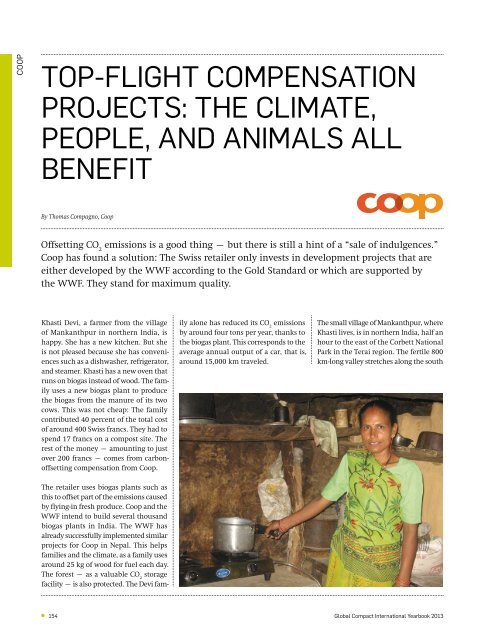Global Compact International Yearbook Ausgabe 2013
The UN Global Compact is the world’s leading platform for corporate sustainability. In describing the future aims of the Global Compact, UN Secretary-General H.E. Ban Ki-moon says: “A growing number of business in all regions recognize the importance of reflecting environmental, social, and economic considerations in their operations and strategies. Now the challenge is to move from incremental process to transformation – in society and markets alike.” The new 2013 edition of the Global Compact International Yearbook offers proactive and in-depth information on key sustainability issues and focuses on recent developments of stakeholder management such as managing corporate legitimacy, for example. Concomitant to this is the call for a more holistic reporting of companies’ financial and nonfinancial performance, which is expressed in the idea of integrated reporting. Furthermore, this edition highlights the connection between the sustainable development of African societies and the ways of managing and governing their natural wealth. The newest developments concerning the move toward a low-carbon economy are shown in the chapter on climate change, which emphasizes the importance of reducing the output of greenhouse gases. Corresponding to the idea of mutual learning, the Global Compact International Yearbook includes 43 good practices of corporate participants that showcase different approaches to the implementation of the Ten Principles of the Global Compact. The Global Compact International Yearbook is a product of the macondo media group and United Nation Publications in cooperation with the Global Compact Office in support of the UN Global Compact and the global advancement of corporate sustainability. It contains 196 pages.
The UN Global Compact is the world’s leading platform for corporate sustainability. In describing the future aims of the Global Compact, UN Secretary-General H.E. Ban Ki-moon says: “A growing number of business in all regions recognize the importance of reflecting environmental, social, and economic considerations in their operations and strategies. Now the challenge is to move from incremental process to transformation – in society and markets alike.”
The new 2013 edition of the Global Compact International Yearbook offers proactive and in-depth information on key sustainability issues and focuses on recent developments of stakeholder management such as managing corporate legitimacy, for example. Concomitant to this is the call for a more holistic reporting of companies’ financial and nonfinancial performance, which is expressed in the idea of integrated reporting. Furthermore, this edition highlights the connection between the sustainable development of African societies and the ways of managing and governing their natural wealth. The newest developments concerning the move toward a low-carbon economy are shown in the chapter on climate change, which emphasizes the importance of reducing the output of greenhouse gases.
Corresponding to the idea of mutual learning, the Global Compact International Yearbook includes 43 good practices of corporate participants that showcase different approaches to the implementation of the Ten Principles of the Global Compact. The Global Compact International Yearbook is a product of the macondo media group and United Nation Publications in cooperation with the Global Compact Office in support of the UN Global Compact and the global advancement of corporate sustainability. It contains 196 pages.
You also want an ePaper? Increase the reach of your titles
YUMPU automatically turns print PDFs into web optimized ePapers that Google loves.
COOP<br />
Top-flight Compensation<br />
Projects: The Climate,<br />
People, and Animals All<br />
Benefit<br />
By Thomas Compagno, Coop<br />
Offsetting CO 2<br />
emissions is a good thing – but there is still a hint of a “sale of indulgences.”<br />
Coop has found a solution: The Swiss retailer only invests in development projects that are<br />
either developed by the WWF according to the Gold Standard or which are supported by<br />
the WWF. They stand for maximum quality.<br />
Khasti Devi, a farmer from the village<br />
of Mankanthpur in northern India, is<br />
happy. She has a new kitchen. But she<br />
is not pleased because she has conveniences<br />
such as a dishwasher, refrigerator,<br />
and steamer. Khasti has a new oven that<br />
runs on biogas instead of wood. The family<br />
uses a new biogas plant to produce<br />
the biogas from the manure of its two<br />
cows. This was not cheap: The family<br />
contributed 40 percent of the total cost<br />
of around 400 Swiss francs. They had to<br />
spend 17 francs on a compost site. The<br />
rest of the money – amounting to just<br />
over 200 francs – comes from carbonoffsetting<br />
compensation from Coop.<br />
The retailer uses biogas plants such as<br />
this to offset part of the emissions caused<br />
by flying-in fresh produce. Coop and the<br />
WWF intend to build several thousand<br />
biogas plants in India. The WWF has<br />
already successfully implemented similar<br />
projects for Coop in Nepal. This helps<br />
families and the climate, as a family uses<br />
around 25 kg of wood for fuel each day.<br />
The forest – as a valuable CO 2<br />
storage<br />
facility – is also protected. The Devi family<br />
alone has reduced its CO 2<br />
emissions<br />
by around four tons per year, thanks to<br />
the biogas plant. This corresponds to the<br />
average annual output of a car, that is,<br />
around 15,000 km traveled.<br />
The small village of Mankanthpur, where<br />
Khasti lives, is in northern India, half an<br />
hour to the east of the Corbett National<br />
Park in the Terai region. The fertile 800<br />
km-long valley stretches along the south<br />
154 <strong>Global</strong> <strong>Compact</strong> <strong>International</strong> <strong>Yearbook</strong> <strong>2013</strong>

















